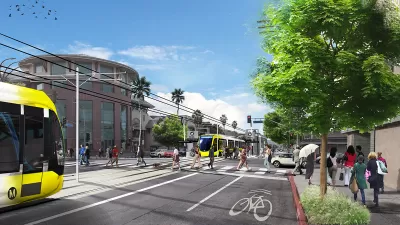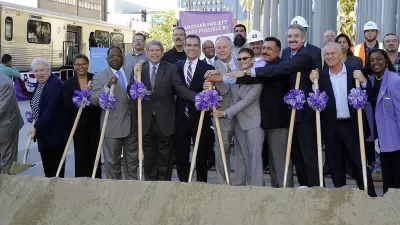Private companies and public transit agencies will share a lot of data to ensure that new mobility on demand (MOD) services are effective and sustainable. Lessons on the kinds of data necessary to make MOD work are emerging in L.A. and Seattle.

Alice Grossman and Paul Lewis share a new research paper on the subject of mobility on demand (MOD) case studies in the Los Angeles and Puget Sound regions, which are testing concepts on the way toward establishing MOD as a component of long-term service plans.
"This report examines the data needs that agency staff need to consider when developing a MOD agreement with private providers," according to the article that introduces the report. "Many MOD providers are relatively new private companies often referred to as transportation network companies (TNCs). Differing goals, organizational structures, requirements, and service types between public transit agencies and private MOD providers must be understood and addressed to provide useful, coordinated projects."
The case study provided by the Los Angeles and Puget Sound regions is made possible by a Federal Transit Administration program called the Mobility on Demand Sandbox Demonstration Program.
FULL STORY: DATA ON DEMAND: A CASE STUDY IN THE LOS ANGELES AND PUGET SOUND REGIONS

Alabama: Trump Terminates Settlements for Black Communities Harmed By Raw Sewage
Trump deemed the landmark civil rights agreement “illegal DEI and environmental justice policy.”

Planetizen Federal Action Tracker
A weekly monitor of how Trump’s orders and actions are impacting planners and planning in America.

Why Should We Subsidize Public Transportation?
Many public transit agencies face financial stress due to rising costs, declining fare revenue, and declining subsidies. Transit advocates must provide a strong business case for increasing public transit funding.

Understanding Road Diets
An explainer from Momentum highlights the advantages of reducing vehicle lanes in favor of more bike, transit, and pedestrian infrastructure.

New California Law Regulates Warehouse Pollution
A new law tightens building and emissions regulations for large distribution warehouses to mitigate air pollution and traffic in surrounding communities.

Phoenix Announces Opening Date for Light Rail Extension
The South Central extension will connect South Phoenix to downtown and other major hubs starting on June 7.
Urban Design for Planners 1: Software Tools
This six-course series explores essential urban design concepts using open source software and equips planners with the tools they need to participate fully in the urban design process.
Planning for Universal Design
Learn the tools for implementing Universal Design in planning regulations.
Caltrans
Smith Gee Studio
Institute for Housing and Urban Development Studies (IHS)
City of Grandview
Harvard GSD Executive Education
Toledo-Lucas County Plan Commissions
Salt Lake City
NYU Wagner Graduate School of Public Service




























